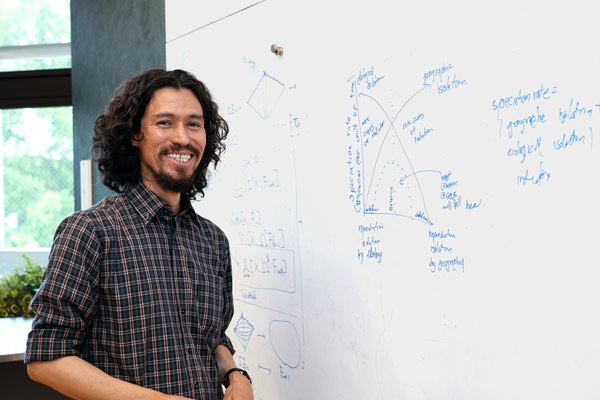Aug. 8, 2024
The sum of species
José Said Gutiérrez Ortega, Special Postdoctoral Researcher
Briefly describe your current research.
My objective is to understand why some species are the way they are and why they live where they live. These characteristics often correspond to how a group of organisms split off as a distinct group, a process known as speciation. Understanding this process is important to help us more clearly recognize what a distinct species is, which is necessary to help assign a value to biodiversity. It also allows us to understand the genetic changes that species undergo to become distinct. This can help generate new knowledge on the functions of certain genes.
How did you become interested in your current field?
I always had a fascination with how an organism’s characteristics seem to correspond to the environment in which they live. I grew up in a city in a desert region of Mexico. There I observed plants that produce thick, succulent trunks, sharp thorns, or tiny leaves to avoid water loss. These kind of observations made me want to learn more about how and why life always tries to persist, even in the most extreme environmental conditions.

What excites you the most about your research?
I joined RIKEN in April 2022 through the Special Postdoctoral Researchers Program and joined the Interdisciplinary Theoretical and Mathematical Sciences Program (iTHEMS). When I applied, I had already been living in Japan for several years, because I also studied my master’s and doctoral courses in this country. I decided to apply and join iTHEMS for two reasons. One is that I was compelled to follow a more computational and theoretical approach to see if I could answer questions that had been opened up by my postdoctoral research, such as—is speciation a process that follows universal rules? Or is speciation the sum of independent evolutionary events that vary across biological groups? Can we unify a theory of speciation? Secondly, I had already met some iTHEMS members and they were (and are) very kind and nice people.
At iTHEMS, I have been learning about how complex concepts can be represented as equations, and how those equations can sometimes then be applied to multiple phenomena. This has helped me to identify ideas that are new to my field and to explore them further.
What is the best thing about working at RIKEN?
RIKEN offers a great atmosphere within which to interact with many of the leading scientists in Japan. There are also many opportunities to start new research projects, and RIKEN allows a working style that prioritizes intellectual freedom. In addition, RIKEN is a very foreigner-friendly institution. Directors, researchers and administrative staff all pay attention to the issues that foreigners may encounter while constructing their careers and personal lives in Japan.
Rate this article

